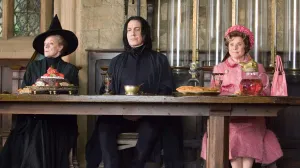Thanks to 1974’s Black Christmas and 1978’s Halloween, the horror world started fully embracing the slasher subgenre and began delivering countless incarnations of killers who set their sights on teenage victims. As studios attempted to find new approaches to the formula, filmmaker Wes Craven was delivering disturbing horror films like The Last House on the Left and The Hills Have Eyes, both of which offered much more unsettling subject matter than masked murderers that were dominating the big screen. In 1984, Craven took the slasher subgenre to the supernatural level with A Nightmare on Elm Street, changing the world of horror and star Heather Langenkamp‘s career forever.
Videos by ComicBook.com
In the film, Langenkamp plays Nancy Thompson, a teen who is plagued by dreams of a man whose body is covered in horrible burns. She and her friends realize that this is the specter of a man killed by their parents, having returned from the grave to torment the community. Nancy refuses to allow the presence terrorize her, ultimately confronting and defeating him, with the original film launching one of horror’s most iconic franchises.
Langenkamp reprised her role in two sequels, including New Nightmare, in which she played a fictional version of herself. The actress’ multiple appearances in the series have cemented her in the annals of horror, having inspired countless fans to face their biggest fears, no matter how big the risk.
In honor of the original film’s 35th anniversary and New Nightmare‘s 25th anniversary, ComicBook.com recently caught up with Langenkamp to discuss her experiences on the film, how they shaped her career, and the ways in which her on-screen role taught her valuable life lessons.

ComicBook.com: A Nightmare on Elm Street was your first major starring role in a feature film, but you’ve previously explained how you weren’t a huge horror fan, but it was writer/director Wes Craven that ultimately inspired you to take the role. What was it about him that made you feel joining the film was the right decision?
Heather Langenkamp: I didn’t really take any convincing. You have to put yourself into that mindset of you’re just starting out and you’ll take pretty much any job you get, and you just want to pay the rent, and you see it as a paying job. I was really just eager to work. I didn’t know anything about Wes Craven. It wouldn’t have been like Martin Scorsese or Francis Ford Coppola who had a really big reputation. I mean, he had no reputation. He was a total nobody, and I was a nobody. Of course, Ronee Blakley and John Saxon and even Robert Englund, they had established careers that were may more established than Wes Craven or myself at this point, in Hollywood anyway. I really just went off a gut feeling like, “What’s the worst that can happen? I’m going to pay my rent for a few more months and be in a real feature film.” And that’s the only decision-making I did.
I was 18; you just aren’t really that analytical at that point in your life. I didn’t watch horror movies, there weren’t that many horror movies to watch, and I certainly didn’t see Last House on the Left. I don’t know how I would have seen it, because VHS hadn’t been invented yet. So it was a really innocent time when you just took people’s word for it that it was going to be legitimate work and you’re going to get your check at the end of every week.
Obviously there’s no way you could have known that the work you were doing at the time was going to have as huge of an impact that it has had, but were there any experiences you had on set that tipped you off that this wasn’t going to be your average horror movie?
I think it was pretty rare to be making a film that had so many special effects in it, so many makeup effects, and a character in full prosthetic makeup. That was in and of itself extremely unique at the time. It was just the beginning of ’80s horror, so we didn’t have a lot of experience thinking about full prosthetic makeup on your lead guy. And also, the bathtub scene, Tina’s death scene, of course, Johnny Depp’s death scene, the scenes in the alleyway. We shot that movie in five weeks and every night was a huge thing, some kind of a special effect, or burn, like Tony sees her catching her on fire, running up the stairs of the basement. Even the simple gray streak in my hair, we tried lots of things for that. There was one scene that was cut, where I was going to fly in a harness. It was really ambitious.
They didn’t just make a low budget movie. It was filled with really difficult effects. And maybe not every day, but every week for sure, there was some extremely major special effect that they were going to pull off. Freddy coming through the ceiling, that day, I remember getting to work and they didn’t really even know how they were going to do it. Usually, you have a pre-production meeting about the big scene and everyone gets around and says, “Okay, how are we going to do this?” And I remember them going, “I’m not really sure how we’re going to do this.” Wes had just written, “He emerges through the wall reaching out towards Nancy while she’s sleeping.” The words sound pretty easy, but the practicality of it was always something that they were constantly at work trying to figure out how they were going to pull these visions off.
I was really aware that this was a different kind of filmmaking, that they were going for broke in creating some effects that no one had ever seen before, really ambitious visions that Wes had, that he was convinced he could bring to the screen. I watched that happen and was always like, “I can’t believe we’re going to try to do this.” And then, lo and behold, we did it, and the bathtub scene is a perfect example of, like, you just trust, “Okay, I’ll just be in that water all day long, and let’s just see if it’s scary.” There was no other scene to look back at to say, “Oh, remember the bathtub scene in this movie when … ?” There was no envisioning it beyond envisioning it right there and then that day, and that’s what made it so exciting.
Given how absurd some of these concepts were, did you ever worry on set that things weren’t going to be pulled off as effectively as Wes had envisioned?
I just never ever those kinds of feelings. I’m not cynical at all, I’m the opposite of cynical. I think, “Let’s try it.” I’m always the first in line to try something stupid. I think cynicism, especially for actors who are part of a project, can just be a death sentence, because you can always see it. You can always tell when there’s actors out there who aren’t really that happy that they’re in that part, or they said, yes, but they’re not really into it. I can spot it a mile away, and I would never hope that anybody said that of me that I wasn’t 100% in it to win it attitude.
And I do believe that if there’s any flaw in the modern consciousness is that need to step back from what you’re doing in case it fails. It’s, of course, always a possibility that things are going to fail, but you can’t go into it with that on your mind at all, or else the chances of it happening are way greater. Wes never, ever, ever expressed any doubt, because he couldn’t, because he’s gotten us all on this train that’s going some place we’ve never been before.
He was so enthusiastic about his vision, and he was just really committed to it. I really believe that the only day that I might have rolled my eyes a little bit was with the tongue coming out of the telephone. I was just like, “This is not going to work.” I’m like, “Oh, God, this is so dumb looking.” I just thought it was obscene. Of course, there’s such a sexual component to it, and this idea of just a man thrusting into your mouth in real life. And so, it had a very grody, offensive quality to it, that I never liked that. There’s several scenes where, in New Nightmare, when Freddy wraps his tongue around my head. I just really didn’t like that either, because I felt Nancy was succumbing to a sexual … not violence. I mean, it’s not violent, but it was just yucky.
And so, those, I didn’t know if those were going to come off at all, or whether that was going to be cut out. I just thought, “They’re either going to cut it, or it’s going to work.” And lo and behold, it really worked, and Wes knew how to shoot it. We were able to shoot that scene in a way where it was really effective and it was disgusting, but yet we were able to get out of it, and it furthers the plot a lot. It actually really moves the plot along.
What was your reaction to seeing the film for the first time? Did that change your opinion that this would alter the horror landscape?
Well, I luckily had the luxury of seeing the dailies every day. Wes was not one of these folks who was that particular of whether you watched yourself on dailies. So I knew that I was happy with my performance, and I knew that the movie looked beautiful. There’s nothing like sitting in a big, full-sized screen and watching dailies every day, because you just see all the variations, and all the different takes, and all the things that didn’t work, and things that worked. And so, because I watched so many of them, and then you’re listening to the director say, “OK, I’m going to pick that cut.” And then I’m like, “Oh, he liked that one best.” And then you see the next scene, and then he picks that take. And you’re like, “Oh, that’s interesting. He’s going to pick that one.”
And so, because I saw the choices that Wes was making when we were filming, when I saw the final movie I wasn’t surprised at the way he put the movie together. I thought it was a really decent movie, but it didn’t really stick in my mind, like, “It’s a masterpiece.” It didn’t ever occur to me that it was a masterpiece, or had the makings of a classic. It was just a really fun movie and there were very few moments in it where you weren’t just totally taken up by the whole magic of it. The ending, we were like, “Oh, my God, I can’t believe they picked that ending.” We had shot so many of them, and different kinds of endings, scary endings, funny endings. Freddy was in them, Freddy wasn’t in them. We did, I don’t know, eight or nine versions of endings. And then that was a surprise to see them pick that one, which really left the universe of Freddy wide open.
When I saw the movie, I didn’t think really that it was going to be important. I lived in a little tiny hovel of an apartment in Hollywood, and I was not aware that it was a successful film. My phone was not ringing off the hook, let’s just put it that way. And so, I really just let it go for many years. At least, I would say, two years, maybe that’s not many, two years, I didn’t really think about it at all. I went back to college from time to time, to try to finish my degree at Stanford, and when I was on campus, no one ever, ever stopped me to say, “Loved you in that movie, Nightmare on Elm Street.”
I was able to be extremely anonymous, which is always great. I remember maybe once somebody came up to me and said, “Oh, I saw that movie that you did.” But it wasn’t obviously being seen by every American. I don’t know, it was a success in a way. But then I did start noticing everything changing three or four years after the movie came out, that we really saw Freddy become something really important in our pop culture and become talked about, and written about, and copied, and all the marketing that went into promoting Freddy, record albums, sweaters, toasters that you can put Freddy’s face on.
I mean, so much came out, lunchboxes, so you saw a lot of that if you went shopping at Oz in those days, which was a store that sold pop culture stuff. And so, then I realized, “Oh, this Freddy Krueger thing, they’re taking it to the limit.” And that Nancy was never part of that push, and Nancy Thompson’s role in the movies weren’t discussed on the same level that Robert and Freddy were discussed.
And then, I guess, in the late ’80s, I started getting notes from people like, “Oh, I’m doing my college dissertation on the ‘Final Girl.’” This whole mystique of the Final Girl grew up in the late ’80s, this concept that basically I really felt was a way of talking about feminism in a way that everybody could digest really easily, and talking about how the quest for equality in film and everything has always been a topic. I just felt they were talking Nancy and making a point about the role of women in film, generally, by pointing out how great a character that she was.
But in my reading of film history, there’s lots of strong women out there. I just didn’t feel like Nancy was that unique, and I never really bought into the whole Final Girl philosophy, because I see Final Girls all over film since the beginning, Clara Bow. I see a lot of silent movies, a lot of crazy women in those too. So I just felt it was this really interesting discussion that America wanted to have about women, and Nancy was a perfect way of talking about it, or especially for young kids who really weren’t familiar with the struggle that women have been through.
Then Nancy becomes a little bit more visible when that discussion of Final Girl starts to be common. And then, in the last 20 years, I’ve seen fans actually come forward who really look at her as a really important figure in the movies. It’s important that Nancy is there, it’s not just the Freddy show. And that’s really gratifying, because I really feel like that movie is all about Nancy. Freddy’s in six minutes of it. It’s really all about Nancy.
Well part of what makes Freddy so fascinating is that he’s much more of a psychological threat than a physical one. Nancy wasn’t merely defeating a creepy villain, she was also denying him any space in her mind, serving as a representation of the mental trauma people have endured at the hands of an abuser.
Exactly. That’s really what I believe, is that it really speaks to all human beings who struggle with the Boogeyman, no matter a physical or a mental one, a bully, a person or anything that causes you that kind of anguish and stress and fear. And that’s why I feel that I don’t want to pin Nancy as just this female character. She’s really just this human being who faces her fear, and that’s always the way Wes would’ve talked about her. It wasn’t that she was in any way a female character. He did everything he could not to make her a female character. He didn’t make me into a boy either.
It’s not about her gender, or anything. It’s about her humanity in the face of fear and what she does. And I try to emphasize that too. Well, and especially, the young men, who come up to me, they know. It’s not that they can admire her and emulate her, it’s because of all the things she’s done. It’s not who she is as a male or a female character. I hope we’re getting beyond the whole the Final Girl discussion. I feel like it’s the “Final Human Being,” the “Final Teenager,” the “Final Person,” who can have the wits about them to face their fear in a way that makes sense and gets them to the end of the movie, that helps them survive to the end of their movie.

You returned for A Nightmare on Elm Street 3: Dream Warriors, but with New Nightmare, Wes really delivered something unexpected, with him playing a version of himself, Robert Englund playing both Freddy and a version of himself, and you playing a version of yourself. Rather than the traditional story, it breaks the fourth wall in how you’re tormented by the concept of this on-screen villain. How did you develop that idea?
I know, it’s so unexpected. I think Wes, he took a long time to come up with that idea. He knew he had to hit the ball out of the park. He knew it couldn’t just be just a rehashing of something that people had seen before. I have to say, in the Nightmare series, because he wrote three of them, is that he was still at a stage where he wanted to continue to push the envelope always. His mission was to push the envelope to a new place, which he did with New Nightmare. And it was so exciting to know that you’re doing something just completely new.
You’re like, “We’ve never done this kind of thing before. How do we even publicize the movie?” was something that became very difficult to even think about, because it was like, “Well, do we conduct interviews as Heather Langenkamp, her real self, or Heather Langenkamp, the actress who’s in the movie? Or do we continue fourth wall craziness into the reality of promoting this film?” It was mind twisting to think about it. It was very new for all of us as well.
You mentioned how much of a relief it was to be able to have anonymity after that first film, so what was it like coming back to the franchise where you also have to play yourself in an autobiographical capacity?
Truthfully, all that autobiographical stuff almost prevented me from being in it. I just really didn’t like it at all, and I told Wes, “I just don’t want to do this at all.” Because if it wasn’t done correctly, it would be a really huge gimmick that looked stupid. It could’ve looked, I’m sure, like, “Oh, here’s a director trying something that is just a gimmick.” Just gimmicky, and precious, and too cute for the room kind of thing, too inside baseball.
Believe it or not, a lot of people don’t want to be famous celebrities. And it’s really disruptive to your life, and it’s not fun. And so, I just said to Wes, “I’m giving away so much to do this part. I don’t have anything left of my privacy, or my personality, or my personal life if I give it to the screen here. It’s not like I’m an actor that’s playing a role. I’m an actress playing myself. And I think it’s worth a lot to me to give that up for you.”
And I said, “If that’s what you want me to do, I want to make the same money that Robert Englund gets, because I think I’m giving way more than Robert Englund’s giving in this, and this is my third movie, and I really feel like you’re asking more of me than anybody in this. You get to do one scene as Wes Craven. I have a husband, and you’ve made this whole universe for me to play myself, but it’s not that much like me. And you have me talking about my mother in this.”
It was a serious, serious talk I had with Wes about it, and he said, “Well, then we’ll pass. They’re going to pass then if you ask for that.” And I said, “Well, have them give me an offer.” And so, it hurt my feelings a great deal that they would not put me on the same level as Robert Englund to make that movie. I understood right then that if I wanted to play the part, I didn’t want to do it if I wasn’t going to be compensated to do it, and I really felt like they weren’t going to make it worth my while.
I eventually, after waiting, I don’t know, a couple days, or a week or so, I said to my husband, “Even though in my heart I know that’s the just deal that they would make with me, that would be the fair deal, I can’t expect Hollywood to ever be fair to a woman, ever. They just aren’t. And so, I have to come down off of my desire of what I wish would be and actually think what can be, and how much can I make of doing this movie, and let my agent make as good a deal as he can given the circumstances.”
I wasn’t a very famous actress. I didn’t have a lot of work. And so, it was my lawyer, he sat down with me. We had a really real discussion about what he thinks that they would do. And I said, “OK, I’ll trust you. We’ll come to an agreement.” And they did, and I ended up doing the movie. But when they said that they would pass, and I was Heather Langenkamp, and that was the role in the film, I just felt like, Hollywood just sucks sometimes, and that was a real moment of that.
It’s really disappointing that you had to come to grips with the fact that another actress would end up landing the role of “Heather Langenkamp.”
I just don’t even know if the movie could have been made, frankly. I mean, maybe it could have, it just would have been even weirder than it already was. So in a way, I just knew that they were lying, but I knew that I didn’t have the ammunition to actually face it, and it was very disheartening. It’s really hard to be a woman in Hollywood. I really feel like it’s a perfect example it’s just so hard to be against the system that has been built to always value certain things more than other things.
It’s a value system, and that value system permeates a lot of our culture, and I’ve constantly been trying to become aware of it and do what I can. But when you can’t do anything, then you sometimes have to just say, “Okay, I’ll try to work from the inside. I’ll try to push this out from the inside.” And in my business life now, my husband and I run a makeup effects company, I am really adamant that not we only hire at least half of our crew as women, but that we give them all the advancing opportunities that any man in our company would get, the same raise schedule, the same transparency.
If I can do that just in my little universe here at AFX Studio, that’s maybe the only control that I will have, but I do really try to walk the walk in this situation especially.
While fans obviously approach you all the time and tell you the impact Nancy has had on their lives, when you look back on the franchise, what are the biggest ways in which Nancy has inspired and impacted you?
Nancy has taught me so much. I mean, I use Nancy’s way of facing just really bad things that are happening in your life, and you just have to face it. You have to set your little Casio wristwatch to tell you what time it really is, which is time to face Freddy. You can’t just keep pushing it down the road. Like they say, “You can’t kick the can down the road.” You can’t think someone else is going to come in and take care of it for you. You can’t assume that it’s all just going to go away if you just close your eyes, or go to sleep.
That philosophy of life is the one thing that I would say I live by. Human life is suffering, man. I mean, we just suffer all the time from whatever is going on around us, and having that attitude gives you so much power. Those are the things that my fans tell me over and over and over again, just taking back a little bit of your power is as easy as just looking Freddy in the face, just looking at it, and trying to figure out what it’s about, and how can you tackle him, how you can get him out of this world.
Facing it is just the secret, it’s the secret, and I think a lot of people got that from Nancy. I know when I see people at conventions and we talk about it, then they’ll maybe divulge what their Freddy is in their life. “What’s your Freddy?” And they’ll come right out and tell me, and it always just gets you. It’s excruciating to listen to the pain in people’s everyday life.
And you’re like, “Thank God, you saw that movie, man. Thank goodness your uncle took you to go see Nightmare on Elm Street, because I don’t know what would’ve happened to you.” And they would have found another way to cope, but for them, this is something that they can watch whenever they’re feeling down or a little bit powerless. And they can pick themselves up and it’s like a self-help video, I think, for some folks that I meet. And that gives me so much gratification.
I constantly tell people, “Whatever it is that you are avoiding, whatever it is, just sit down and tell yourself you have to face it. And it will get better just by you doing that.” It’s a tough lesson. Everyone in America loves to escape. We love it, it’s our pastime.
And that doesn’t mean it’s always about facing a tormentor, “Facing your Freddy” could be something as simple as telling your boss something your nervous to ask for.
Those are the worst Freddys, like the little ones, because they’re nagging at you all the time, and they’re the easiest ones to run away from. It’s like, “Oh, I’ll do that tomorrow.” It’s like, “No, sit down, ask yourself, what’s your Freddy today?” And it’s like, yeah, asking your boss for a raise, or telling your boss, yeah, that something is bothering you, or it can be small, you know?
And taking care of business, that’s what Nancy … she was so good at it.
*****
You can keep up to date with Heather’s latest projects by following her on Twitter and on her personal website.
What’s the biggest lesson you took away from one of her characters? Let us know in the comments below or hit up @TheWolfman on Twitter to talk all things horror and Star Wars!








